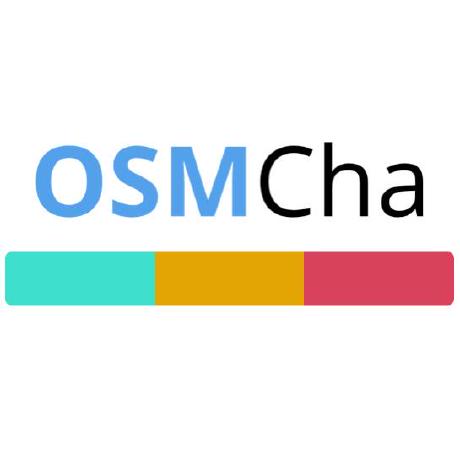
osmcha
Python package to detect suspicious OSM changesets
GPL-3.0 License
osmcha
OSM Changeset Analyser, osmcha, is a Python package to detect suspicious OSM changesets.
It was designed to be used with osmcha-django <https://github.com/osmcha/osmcha-django>_,
but also can be used standalone or in other projects.
You can report issues or request new features in the the
osmcha-frontend repository <https://github.com/osmcha/osmcha-frontend>_.
.. image:: https://badge.fury.io/py/osmcha.svg :target: http://badge.fury.io/py/osmcha
.. image:: https://coveralls.io/repos/OSMCha/osmcha/badge.svg :target: https://coveralls.io/r/willemarcel/osmcha
.. image:: https://img.shields.io/badge/Contributor%20Covenant-v2.0%20adopted-ff69b4.svg :target: CODE_OF_CONDUCT.md
Installation
.. code-block:: console
pip install osmcha
Usage
Python Library
You can read a replication changeset file <https://planet.openstreetmap.org/replication/changesets/>_
directly from the web:
.. code-block:: python
from osmcha.changeset import ChangesetList c = ChangesetList('https://planet.openstreetmap.org/replication/changesets/002/236/374.osm.gz')
or from your local filesystem.
.. code-block:: python
c = ChangesetList('tests/245.osm.gz')
c.changesets will return a list containing data of all the changesets listed in the file.
You can filter the changesets passing a GeoJSON file with a polygon with your
interest area to ChangesetList as the second argument.
Finally, to analyse an especific changeset, do:
.. code-block:: python
from osmcha.changeset import Analyse ch = Analyse(changeset_id) ch.full_analysis()
Customizing Detection Rules
You can customize the detection rules by defining your prefered values when
initializing the ``Analyze`` class. See below the default values.
.. code-block:: python
ch = Analyse(changeset_id, create_threshold=200, modify_threshold=200,
delete_threshold=30, percentage=0.7, top_threshold=1000,
suspect_words=[...], illegal_sources=[...], excluded_words=[...])
Command Line Interface
----------------------
The command line interface can be used to verify an especific changeset directly
from the terminal.
Usage: ``osmcha <changeset_id>``
Detection Rules
===============
``osmcha`` works by analysing how many map features the changeset created, modified
or deleted, and by verifying the presence of some suspect words in the ``comment``,
``source`` and ``imagery_used`` fields of the changeset. Furthermore, we also
consider if the software editor used allows to import data or to do mass edits.
We consider ``powerfull editors``: JOSM, Merkaartor, level0, QGIS and ArcGis.
In the ``Usage`` section, you can see how to customize some of these detection rules.
Possible Import
---------------
We tag a changeset as a ``possible import`` if the number of created elements is
greater than 70% of the sum of elements created, modified and deleted and if it
creates more than 1000 elements or 200 elements case it used one of the ``powerfull editors``.
Mass Modification
-----------------
We consider a changeset as a ``mass modification`` if the number of modified elements
is greater than 70% of the sum of elements created, modified and deleted and if it
modifies more than 200 elements.
Mass Deletion
-------------
All changesets that delete more than 1000 elements are considered a ``mass deletion``.
If the changeset deletes between 200 and 1000 elements and the number of deleted
elements is greater than 70% of the sum of elements created, modified and deleted
it's also tagged as a ``mass deletion``.
Suspect words
-------------
The suspect words are loaded from a `yaml file <osmcha/suspect_words.yaml>`_.
You can customize the words by setting another default file with a environment
variable:
.. code-block:: console
export SUSPECT_WORDS=<path_to_the_file>
or pass a list of words to the ``Analyse`` class, more information on the section
``Customizing Detection Rules``. We use a list of illegal sources to analyse the
``source`` and ``imagery_used`` fields and another more general list to examine
the comment field. We have also a list of excluded words to avoid false positives.
New mapper
-----------
Verify if the user has less than 5 edits or less than 5 mapping days.
User has multiple blocks
------------------------
Changesets created by users that has received more than one block will be
flagged.
OSM Server Configuration
------------------------
If you need to use OSMCha with another OSM server instance, you need to configure the OSM_SERVER_URL environment variable, without trailing slash. Example:
.. code-block:: console
export OSM_SERVER_URL='https://www.openhistoricalmap.org'
Tests
======
To run the tests on `osmcha`:
.. code-block:: console
git clone https://github.com/osmcha/osmcha.git
cd osmcha
pip install -e .[test]
py.test -v
Publishing a new version
=========================
Update the version number in ``osmcha/__init__.py`` and execute
the following commands:
.. code-block:: console
python setup.py bdist_wheel
twine upload dist/osmcha-{version}...
Changelog
=========
Check `CHANGELOG <CHANGELOG.rst>`_ for the version history.
Related projects
================
* `osmcha-django <https://github.com/osmcha/osmcha-django>`_ - backend and API
* `osmcha-frontend <https://github.com/osmcha/osmcha-frontend>`_ - frontend of the `OSMCha <https://osmcha.org>`_ application
* `osm-compare <https://github.com/mapbox/osm-compare>`_ - library that analyse OSM features to input it to OSMCha
License
=======
GPLv3